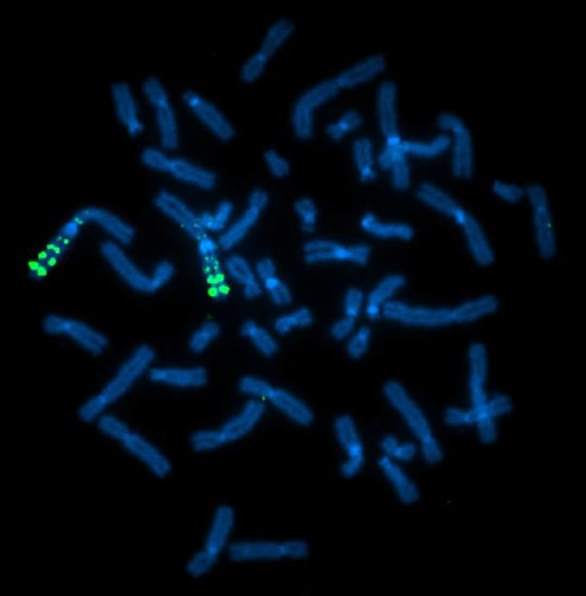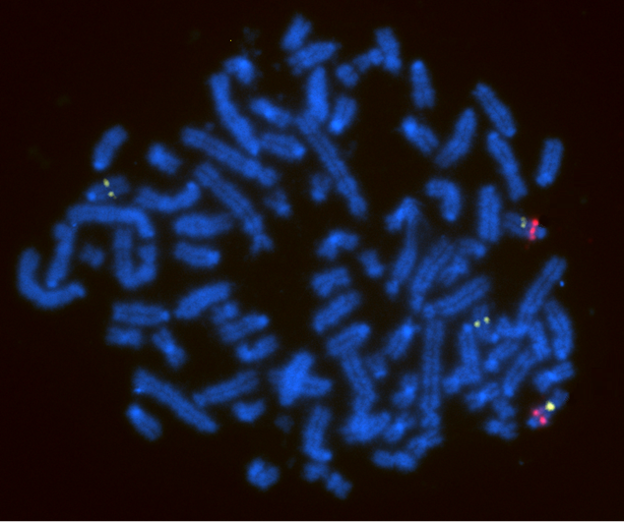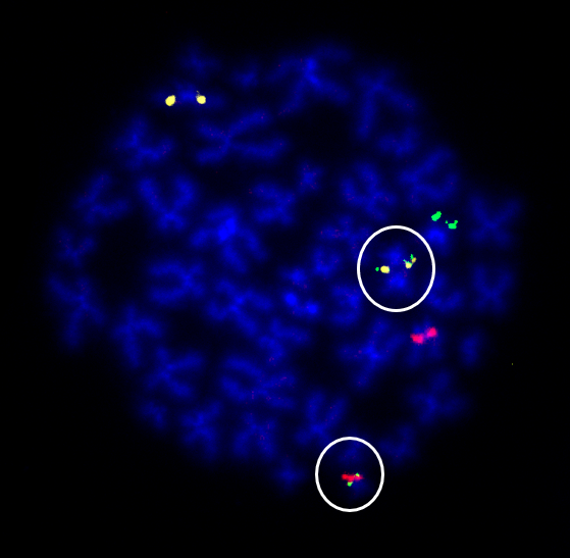Pinpoint FISH™ Assays
High-resolution FISH assays and custom probes for any published genome.

Above Fig.: Custom Pinpoint FISH probe designed for Chromosome 1 Ladder.
Experience the Next Generation of FISH Assays with Pinpoint FISH.
Optimize your FISH assays with our bioinformatically-designed, synthetic Pinpoint FISH custom probes and assay services.
Custom Pinpoint FISH probes are a straightforward and cost-effective way to assess unique regions or targets.
Key Advantages of Pinpoint FISH Services
- Comprehensive: Expert assay design, execution, and analysis.
- Cell culture service for both interphase and metaphase analysis.
- Custom designs
- Available for any published genome: Human, mouse, rat, CHO, canine, non-human primates, viral vectors, and transgenes.
- High-resolution custom probes: Designed for your custom target.
- Broad compatibility: Tailored multiplexing and reliable hybridization.
- Visualization of small targets.
Contact us to schedule a meeting to discuss how we can assist you with your FISH assays and custom probe design for your research needs!

Above Fig.: Polyploid rat cell with two HIV sequence integration signals (red) and four control signals (yellow).
Non-human species probes inject a layer of additional complexity in humanized model systems.
KromaTiD has proven experience in designing and producing custom probes for any sequenced species. Our expert experience in culture, harvest, slide preparation and hybridization of non-human lines provide you confidence in your assay results.
Rodent models play a critical role in research. Here, two custom probes were created for a project involving rats, one targeting an integrated HIV sequence (red), and the other targeting TP53 (yellow) as a control. Two integrations are detected in this polyploid, metaphase spread.

Above Fig.: Edited T cell hybridized with custom probes labeling loci of interest, two of which are involved in a translocation. (circles) The top circle features a dicentric chromosome.
High-resolution is critical when assaying gene editing outcomes.
KromaTiD designs custom probes to detect structural rearrangements at key gene editing loci, as in this image of a triple-edited T cell. The two circled objects each contain translocation derivatives, with the top one representing a dicentric chromosome.
KromaTiD can design assay components to target edit sites, transgenes, and homology markers, depending on the strategy and dataset required. Designs can target loci as small as 2 kb.

Above Fig.: Breast cancer tissue was probed with HER2 Pinpoint FISH probe (red) and analyzed for amplification. (A) Normal (non-amplified) HER2 signals (B-C) Examples of cells with HER2 amplification.
Custom Tissue Assays.
Accurate HER2 testing can help reduce unnecessary costs and treatment side-effects, and have important prognostic implications, which means HER2-related research has a high potential pay-off. Assessment of the HER2 amplification status of a sample can be very nuanced.
It is essential that FISH probes perform with a high signal-to-noise ratio, even within the heterogeneous setting of a solid tissue sample, where the outcome is influenced by factors like fixation chemistry and time, as well as subsequent digestion and permeabilization steps. Your samples are precious, as are your project’s resources.
